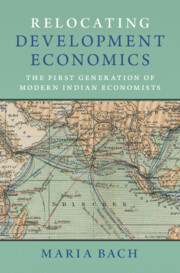Book contents
- Relocating Development Economics
- Historical Perspectives on Modern Economics
- Relocating Development Economics
- Copyright page
- Dedication
- Contents
- Figures
- Tables
- Acknowledgements
- 1 Introduction: Relocating Development Economics
- 1 The Context
- 2 The Beginnings of Indian Economics
- 3 Stages of Civilisation
- 4 Regress
- 5 Developing Balanced Growth at Home
- 6 A Global Win–Win Model for Development
- Epilogue: Multiple Definitions of Progress and Development
- References
- Annex I Archival Sources – Major Works of the First Generation of Modern Indian Economists, 1870–1905
- Index
- Other Books in the Series (continued from page ii)
- References
References
Published online by Cambridge University Press: 05 December 2024
- Relocating Development Economics
- Historical Perspectives on Modern Economics
- Relocating Development Economics
- Copyright page
- Dedication
- Contents
- Figures
- Tables
- Acknowledgements
- 1 Introduction: Relocating Development Economics
- 1 The Context
- 2 The Beginnings of Indian Economics
- 3 Stages of Civilisation
- 4 Regress
- 5 Developing Balanced Growth at Home
- 6 A Global Win–Win Model for Development
- Epilogue: Multiple Definitions of Progress and Development
- References
- Annex I Archival Sources – Major Works of the First Generation of Modern Indian Economists, 1870–1905
- Index
- Other Books in the Series (continued from page ii)
- References
Summary

Information
- Type
- Chapter
- Information
- Relocating Development EconomicsThe First Generation of Modern Indian Economists, pp. 161 - 177Publisher: Cambridge University PressPrint publication year: 2024
